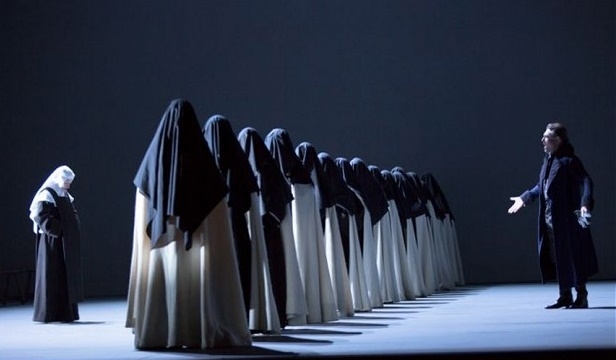Top Ten: Classical & Opera
From reimaginings of the resurrection to gorgeous performances of L'Ormindo: the best classical concerts and operas of 2014.

This concert contained an education: Mendelssohn’s Scottish symphony was transformed in the hands of Gardiner. What had been considered a superficial work became seismic, with plenty of gloom lurking in dark corners. Gardiner gave to Schumann’s piano concerto a considerable amount of heft, yet this could not dwarf the exquisite pianism of Maria Joao Pires. Outstanding.
Prom 64: Berlin Philharmonic, Sir Simon Rattle, Rachmaninov and Stravinsky
The concert of the year had to be Prom 64, a masterclass of musicianship from the Berlin Philharmonic Orchestra, under the baton of Simon Rattle, Rachmaninov’s Symphonic Dances have rarely had so much life in them and Stravinsky's Firebird –with that wondrous horn solo- was pure magic.
The Cardinall's Musick: 25th Anniversary Concert, Wigmore Hall
Wigmore Hall housed a veritable feast of Renaissance polyphony this summer, with holy music from Byrd, Tallis and Gibbons, as well as continental imports Allegri, Praetorious and Guerrero. The vocal ensemble picked out the labyrinthine detail in this sacred music with extraordinary precision, yet lost none of the richness. A transcendent evening.
LSO with Haitink and Mitsuko Uchida: Brahms Symphony No. 4, Barbican
Two of classical music's greats came together for a concert that was traditional (Debussy, Mozart, Brahms) but with fire at its heart. Haitink, of course, was flawless as leader. Mitsuko Uchuda, one of the finest Mozart interpreters playing today, played the E flat concerto with such honesty –and just the right amount of sparkle- that the audience was utterly rapt.
John Adams: The Gospel According To The Other Mary
Part-opera and part-oratorio, John Adams’ weighty work re-imagines the Resurrection through the eyes of Mary Magdalene and her siblings Martha and Lazarus. The ENO triumphed over Adams’ brooding score, structured with big choruses and arias and the singing was impeccable. But it was flex dancer Banks who stole the show (and our hearts). We want to see it again.

Mussorgsky’s Boris Godunov, Barbican
Acclaimed Russian conductor Velery Gergiev who gave a stellar performance of the unrevised version of Murrosgsky’s Boris Godunov. With a relatively small orchestra of 60, Godunov created a sensational sound. The Tiffin Boys’ Choir produced an especially notable performance, allowing the full genius of Mussorgsky’s opera to made apparent.
Joyce DiDonato, Stella di Napoli
Joyce DiDonato has been heralded as one of the finest mezzo-sopranos of her time, and not without cause. Going back to the music with which she first made her name, DiDonato performed Donizetti, Bellini and Rossini, demonstrating her extensive musical expertise and incredible technical ability. Emotion was always central to her performance from the dizzying highs of ‘Se fino al ciel ascendere’ to Bellini’s ‘Dopo l’oscuro nembro’ where her exposed voice demonstrated its prowess. This was a performance almost without fault by a
performer who yet again has not failed to impress.
Thomas Adès: Powder Her Face, ENO
The ENO’s restaging of Adès' somewhat dark 1995 opera about the scandalous divorce of the “Dirty” Duchess of Argyll was bound to be exciting. Adès’ has had a series of commissions from names such as the Royal Opera House, the Berlin Philharmonic and the BBC Proms throughout his career. Powder Her Face was his seminal work, and this performance, although years on, was still exhilarating and fiery, with a stunning performance by Amanda Roocroft who threw herself into the role. Timothy Redmond led the performance with energetic rigour, bringing Adès' score to its full potential in the difficult space of Ambika P3.
Dialogues des Carmélites
A performance from Sir Simon Rattle is always going to be a quick-seller, but this one had a particularly unique edge. Rattle conducted Robert Carsen’s staging of Pounlenc’s opera, based on the true story of the execution of Carmelite nuns in the French revolution – and, in an inventive twist, the stage was filled not with seasoned performers or an extensive set, but a chorus made up of sixty-seven homeless, ex-convicts and unemployed to play the revolutionary populace. This surprise feat was not announced prior to the opening, and created create a very real sense of energy on stage. Wonderful performances were enjoyed from Sophie Koch and Deborah Polaski, as well as an incredibly colourful interpretation of the score by Rattle.
L’Ormindo, Sam Wanamaker Playhouse
Our eager anticipation of this period production of Cavalli’s opera, staged in the Globe’s brand new Sam Wanamaker Playhouse, was not to be met with disappointment. The new space proved a wonderful reinvention of Jacobean theatre; its wooden paneling, atmospherically candlelit, lent the performance much authenticity and intensity, perfectly suited to baroque. Superb performances from the Early Opera Company, and the entire cast.






